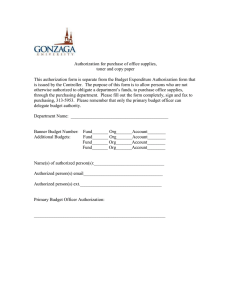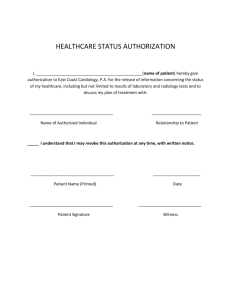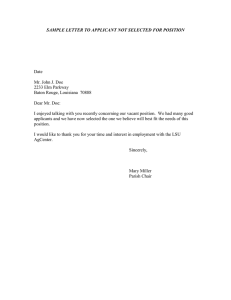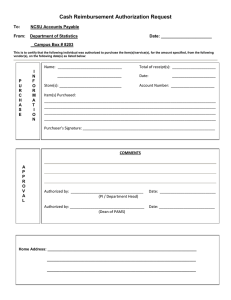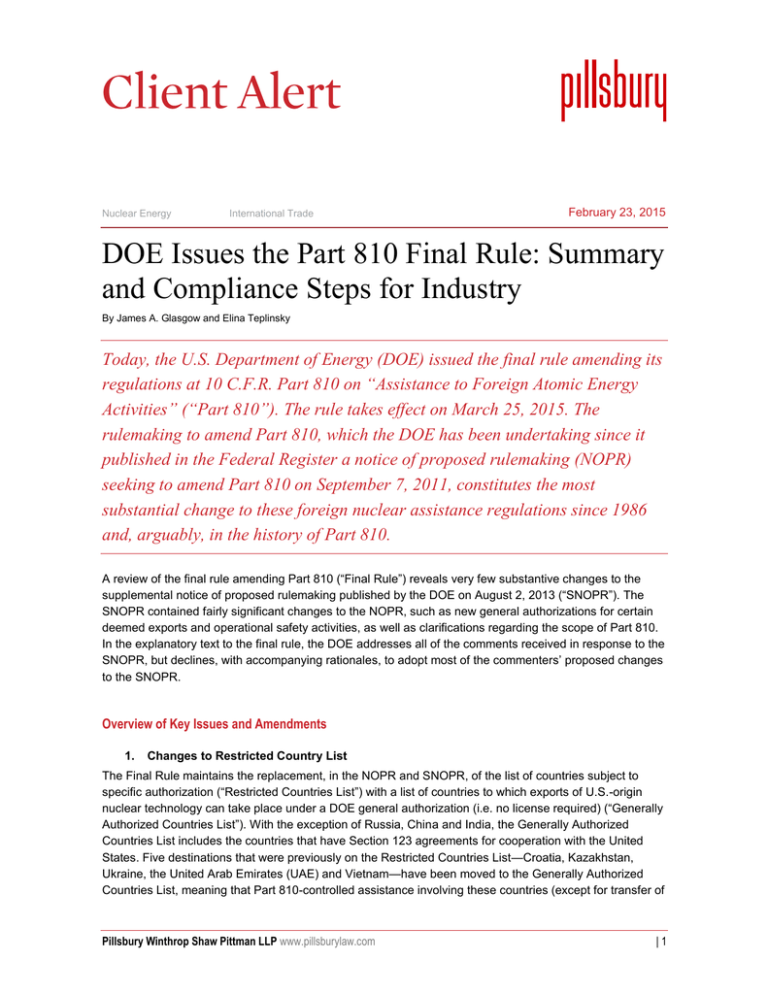
Client Alert
Nuclear Energy
Nuclear Energy
International Trade
February 23, 2015
DOE Issues the Part 810 Final Rule: Summary
and Compliance Steps for Industry
By James A. Glasgow and Elina Teplinsky
Today, the U.S. Department of Energy (DOE) issued the final rule amending its
regulations at 10 C.F.R. Part 810 on “Assistance to Foreign Atomic Energy
Activities” (“Part 810”). The rule takes effect on March 25, 2015. The
rulemaking to amend Part 810, which the DOE has been undertaking since it
published in the Federal Register a notice of proposed rulemaking (NOPR)
seeking to amend Part 810 on September 7, 2011, constitutes the most
substantial change to these foreign nuclear assistance regulations since 1986
and, arguably, in the history of Part 810.
A review of the final rule amending Part 810 (“Final Rule”) reveals very few substantive changes to the
supplemental notice of proposed rulemaking published by the DOE on August 2, 2013 (“SNOPR”). The
SNOPR contained fairly significant changes to the NOPR, such as new general authorizations for certain
deemed exports and operational safety activities, as well as clarifications regarding the scope of Part 810.
In the explanatory text to the final rule, the DOE addresses all of the comments received in response to the
SNOPR, but declines, with accompanying rationales, to adopt most of the commenters’ proposed changes
to the SNOPR.
Overview of Key Issues and Amendments
1.
Changes to Restricted Country List
The Final Rule maintains the replacement, in the NOPR and SNOPR, of the list of countries subject to
specific authorization (“Restricted Countries List”) with a list of countries to which exports of U.S.-origin
nuclear technology can take place under a DOE general authorization (i.e. no license required) (“Generally
Authorized Countries List”). With the exception of Russia, China and India, the Generally Authorized
Countries List includes the countries that have Section 123 agreements for cooperation with the United
States. Five destinations that were previously on the Restricted Countries List—Croatia, Kazakhstan,
Ukraine, the United Arab Emirates (UAE) and Vietnam—have been moved to the Generally Authorized
Countries List, meaning that Part 810-controlled assistance involving these countries (except for transfer of
Pillsbury Winthrop Shaw Pittman LLP www.pillsburylaw.com
|1
Client Alert
Nuclear Energy
sensitive nuclear technology and other sensitive activities listed in §810.7) no longer requires DOE’s
specific authorization. Kazakhstan, Ukraine, the UAE and Vietnam were generally authorized because
these countries executed Section 123 agreements with the United States. Croatia was generally
authorized because it became a member of the European Union in July 2013.
Bangladesh, Thailand and Peru—countries originally included on the Generally Authorized Countries List
in the NOPR—have been removed from that list in the final rule because Section 123 Agreements with
these countries have expired. The DOE retained Norway on the Generally Authorized Countries List
despite the expiration of the U.S.-Norway 123 Agreement because the U.S. and Norway are negotiating a
renewal of that agreement.
Finally, the Final Rule maintains the limitation on generally authorized activities in Chile and Mexico to
activities within the scope of the trilateral IAEA project agreements with those countries.
2.
New Reporting Requirements for Activities in Ukraine
Although the Final Rule generally authorizes Part 810-controlled activities in Ukraine, the DOE has added
a new advance notification requirement at 10 C.F.R. §810.14 for these activities, stating that “transfers of
nuclear technology and assistance to areas that are not under control of the Government of Ukraine could
present a proliferation risk.” Companies and individuals planning to engage in generally authorized
activities in Ukraine are now required to file a report within 10 days of commencing these activities. The
DOE could then determine that the activities are subject to specific authorization, requiring the licensee to
obtain specific authorization before engaging in the activities.
In addition, 10 C.F.R. §810.14 requires companies and individuals completing a generally authorized
activity in Ukraine to provide to DOE within 10 days of the original technology transfer a written
confirmation that such transfer was completed.
3.
New Deemed Export General Authorization
The Final Rule retains the new general authorization at §810.6(b), proposed in the SNOPR, for providing
access to Part 810-controlled technology to individuals at U.S. nuclear facilities who have been granted
unescorted access authorization in accordance with NRC requirements. The DOE did not accept the
suggestion, offered in several public comments, that this general authorization be extended to individuals
who have access to safeguards information or have completed other types of security checks. Further, the
DOE maintained in the Final Rule the rigorous reporting requirements proposed in the SNOPR for
companies using the §810.6(b) general authorization.
4.
New General Authorization for Operational Safety Activities
The Final Rule also retains the new general authorizations at §810.6(c)(2) and §810.6(c)(3) for
“operational safety” activities. The Final Rule maintains the distinction, proposed in the SNOPR, between
activities in the United States and activities overseas: generally authorized activities involving operational
safety technologies in the United States include assistance to proposed and new-build civilian nuclear
facilities, while generally authorized operational safety activities overseas are limited to assistance to
existing plants. The rationale provided by the DOE for this distinction is that “providing information during
the design and construction of a new facility in a destination requiring specific authorization constitutes a
much higher proliferation risk.” The use of the general authorizations under §810.6(c)(2) and §810.6(c)(3)
are subject to a written notice and approval requirement.
Pillsbury Winthrop Shaw Pittman LLP www.pillsburylaw.com
|2
Client Alert
5.
Nuclear Energy
Dual and Multi-Country Nationals
The explanatory text of the Final Rule clarifies that the DOE will continue to consider all countries of
citizenship of foreign nationals who are potential recipients of Part 810-controlled technology and make
nationality determinations for purposes of Part 810 on a case-by-case basis.
6.
Steam Generator Technology
The DOE clarified in the Final Rule that technology for steam turbine and generator equipment in Boiling
Water Reactors (BWRs) is excluded from the scope of Part 810. Such technology will continue to be
controlled under the Commerce Department’s Export Administration Regulations (EAR). In supplemental
guidance to the Final Rule, the DOE clarified that technology for steam generators in Pressurized Water
Reactors (PWRs) will continue to be subject to Part 810 controls.
7.
Widely Available Technology
The DOE declined to exclude from the Scope of Part 810 or to provide a fast-track specific authorization
for the export of widely available Light Water Reactor (LWR) technologies, as suggested by some
commenters. However, the DOE noted that it will address technology determinations and transfers as part
of its Process Improvement Program (PIP), being developed in parallel to the issuance of the Final Rule.
Next Steps for Compliance
As a result of the reorganization of the country lists, certain generally authorized activities will become
subject to specific authorization. In accordance with §810.16, companies engaging in such activities have
180 days to request specific authorization and may continue their activities until DOE acts on the request.
Companies who have not reported activities that are generally authorized under the current version of Part
810 should do so as soon as possible. Companies who filed specific authorization requests for activities
that will become subject to general authorization under the Final Rule must withdraw such requests.
If you have any questions about the content of this alert, please contact the Pillsbury attorney with whom
you regularly work, or the authors below.
James A. Glasgow (bio)
Washington, DC
+1.202.663.9200
james.glasgow@pillsburylaw.com
Elina Teplinsky (bio)
Washington, DC
+1.202.663.9009
elina.teplinsky@pillsburylaw.com
About Pillsbury Winthrop Shaw Pittman LLP
Pillsbury is a full-service law firm with an industry focus on energy & natural resources, financial services
including financial institutions, real estate & construction, and technology. Based in the world's major
financial, technology and energy centers, Pillsbury counsels clients on global business, regulatory and
litigation matters. We work in multidisciplinary teams that allow us to understand our clients’ objectives,
anticipate trends, and bring a 360-degree perspective to complex business and legal issues—helping
clients to take greater advantage of new opportunities, meet and exceed their objectives, and better
mitigate risk. This collaborative work style helps produce the results our clients seek.
This publication is issued periodically to keep Pillsbury Winthrop Shaw Pittman LLP clients and other interested parties
informed of current legal developments that may affect or otherwise be of interest to them. The comments contained herein
do not constitute legal opinion and should not be regarded as a substitute for legal advice.
© 2015 Pillsbury Winthrop Shaw Pittman LLP. All Rights Reserved.
Pillsbury Winthrop Shaw Pittman LLP www.pillsburylaw.com
|3

